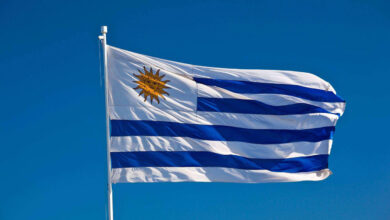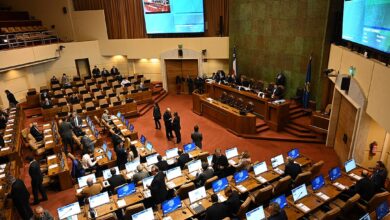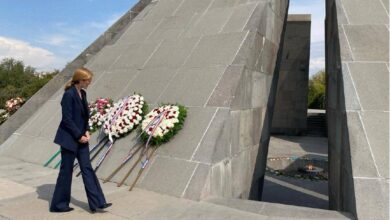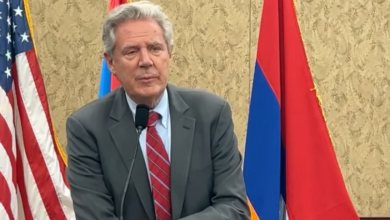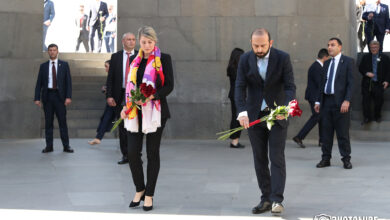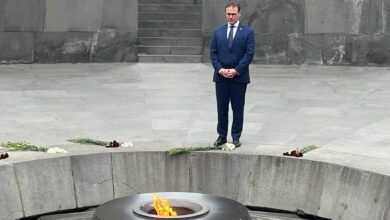
An op-ed by the Ambassador of Armenia to Latvia Tigran Mkrtchyan has been published in the largest Latvian electronic periodical delfi.lv.
The full test of the article is provided below:
“You see that fate is pushing Turkey from the west to the east. We left the Balkans, we are leaving also Africa, but we must spread to the east, where our blood, life, and language are. This is spontaneous gravity, our brothers are in Baku, Dagestan, Turkestan, and Azerbaijan. We need a route to there, and you Armenians are standing in our way.”
Halil Bey, Foreign Minister of the Ottoman Empire
May. 1918, Batumi
This proclamation of 1918 clearly explains why the Armenians were brutally annihilated in their historical fatherland in 1915, why lesser scale massacres took place before and after that, why Turkey attacked the newly established Republic of Armenia in 1920 and together with the Bolsheviks put an end to our independence a century ago. The logic it expresses also explains why Turkey’s present authoritarian leader is – together with the dictator of Azerbaijan – presently doing everything in his power against Armenia. The Karabakh conflict is and has been used by Turkey to pressure Armenia as much as possible.
Western media often engages in a pointless discussion of the instigators of this present war. Knowledge of the context, and simple logic, leaves no room for doubt. The Republic of Artsakh as well as the Republic of Armenia had no motive, no military or political objective that could have led them to start a conflict against a country whose military budget is as large as the entire budget of Armenia. Experts dealing with our region know this simple truth well enough.
For years, Azerbaijan has consistently violated the 1994-1995 trilateral agreements on the establishment of the ceasefire regime – which has no expiration. Azerbaijan has also consistently rejected the proposals of the OSCE Minsk Group Co-Chairmanship that would introduce investigation mechanisms for ceasefire violations and strengthen ceasefire monitoring, and thus retained its capacity to use force and to instigate a “blame game.”
After July 2020 aggression against Armenia, there were again talks about the installation of ceasefire violation mechanisms on the Line of Contact with Nagorno-Karabakh and the borders between Armenia and Azerbaijan, which yet again fell on deaf ears in Baku. The fact that on September 25, Azerbaijan rejected the request of the Personal Representative of the OSCE Chairperson-in-Office to monitor the line of contact is a case in point. It clearly reveals Azerbaijan’s main objective: to cover up its plans to unleash a war.
Justifying the aggression, the leader of Azerbaijan in his address to the nation underlined that “we are fighting on our land. Today, Azerbaijan’s Army is dealing crushing blows to the enemy on our soil.” This justification reminded me of an interesting incident that happened at the Munich Security Conference in February 2015. After the Azerbaijani President had accused Armenians of all possible sins of the world, I tried to ask a question, which I eventually managed to do by grabbing the microphone at the last minute and facing him directly. My question was a reminder that the OSCE Minsk Group Co-Chairs had “called on Azerbaijan to observe its commitments to the peaceful settlement of the Nagorno-Karabakh conflict.” I also mentioned that “blame games” didn’t address the most important issue- the settlement of a conflict commences when guns stop firing. So I appealed to him saying: “Stop firing!” It irritated the Azerbaijani leader and he replied using the exact same words he said a few days ago, namely: on Azerbaijani soil, Azerbaijani soldiers can fire as much as they like and in whatever direction they wish.
It is this very perception (in this case- misperception) which ensured that Azerbaijan lost Karabakh, that had been annexed to it by Stalin in 1921. By killing Armenians “on Azerbaijani soil” (in Sumgait and Baku), it not only ensured that the Armenians of Karabakh defend themselves and undertake the restoration of justice, it lost the moral argument regarding Azerbaijan’s right to control Karabakh. By unleashing a war against Karabakhi Armenians and using indiscriminate shelling of residential areas in 1991, Azerbaijan lost Karabakh, in reality never having it, since Karabakh was never part of independent Azerbaijan. The same thing can be said of the 2016 April war, the first images of which showed the horribly mutilated bodies of elderly Armenian people in Talysh and of beheaded soldiers. The same holds true for the 2020 July attack of north-eastern borders of Armenia when civilian infrastructures were targeted, in clear violation of international humanitarian law. The same holds for this current attack, during which children are forced to hide in cellars throughout Stepanakert, just as they were in 1991-94.
I recall that two centuries ago in his criticism against the British government which was trying to crush American colonies’ right to self-determination, political thinker, Edmund Burke famously said “a nation is not governed, which is perpetually to be conquered.” It is only when we bear in mind what he said that we will be closer to establishing peace in Artsakh, and a solution in the best interest of the people who have been living in that region for several millennia.
External players can play both positive as well as negative role. The Turkish military presence and encouragement is the most worrying aspect of this war. Again, some of the analysts in the west attempt to equate Turkish and Russian roles in this situation – a tactic which is artificial at its best and misleading at its worst. Russia is an OSCE Minsk Group Co-Chair, has very close ties with Yerevan and Baku, and has acted as a mediator. Turkey has no diplomatic relations with Armenia, keeps the borders with Armenia closed and unquestionably supports Azerbaijan in all possible ways. Moreover, after Turkey’s massive joint military exercises with Azerbaijan in August it left some of its military equipment and personnel in Azerbaijan. Now Turkish military experts are allegedly fighting alongside the Azerbaijani, who are using those Turkish weapons including UAVs and warplanes. According to credible sources, Turkey is recruiting and transporting foreign terrorist fighters to Azerbaijan. Meanwhile, the NATO-member Turkey provides full political and propaganda support to Azerbaijan at the highest level of its leadership.
The situation on the ground clearly indicates that the people of Artsakh are fighting against the Turkish-Azerbaijani alliance. Turkey, a worthy heir of the Ottoman Empire that a century ago did everything to annihilate the Armenian people in their historical homeland and still justifies that crime now supports Azerbaijan in all possible ways in its attempt to carry out the same genocidal acts in the South Caucasus. This genocidal Turkish-Azerbaijani alliance is a serious threat to the peoples of the region.
This is exactly why we need more targeted statements and actions. Appeals to “both sides” or “all sides” to cease hostilities are not useful. With very clear visible aggressors on the ground, such appeals lessen the responsibility of the aggressor and incriminate the victim. Time and again we have witnessed the results of such fallacious equations in history. Sanctions regimes must be initiated against the instigators of wars. War must be stopped immediately, as every hour young people are dying. Artsakh and Armenia are protecting their fatherland. Foreign mercenaries and soldiers in Azerbaijan are fighting for the sickly ambitions of dictators of Ankara and Baku!
As the great human rights defender Andrei Sakharov said in November 1989: “For Azerbaijan, the issue of Karabakh is a matter of ambition, for the Armenians of Karabakh it is a matter of life and death.”


